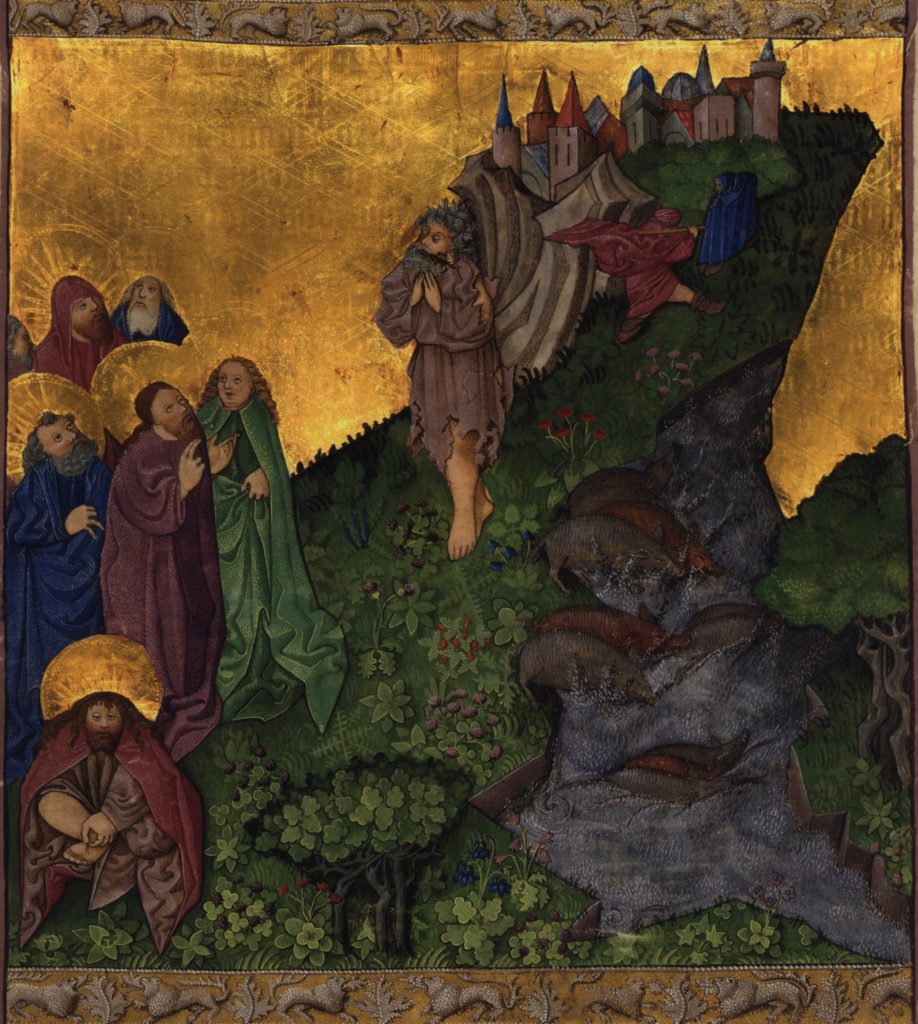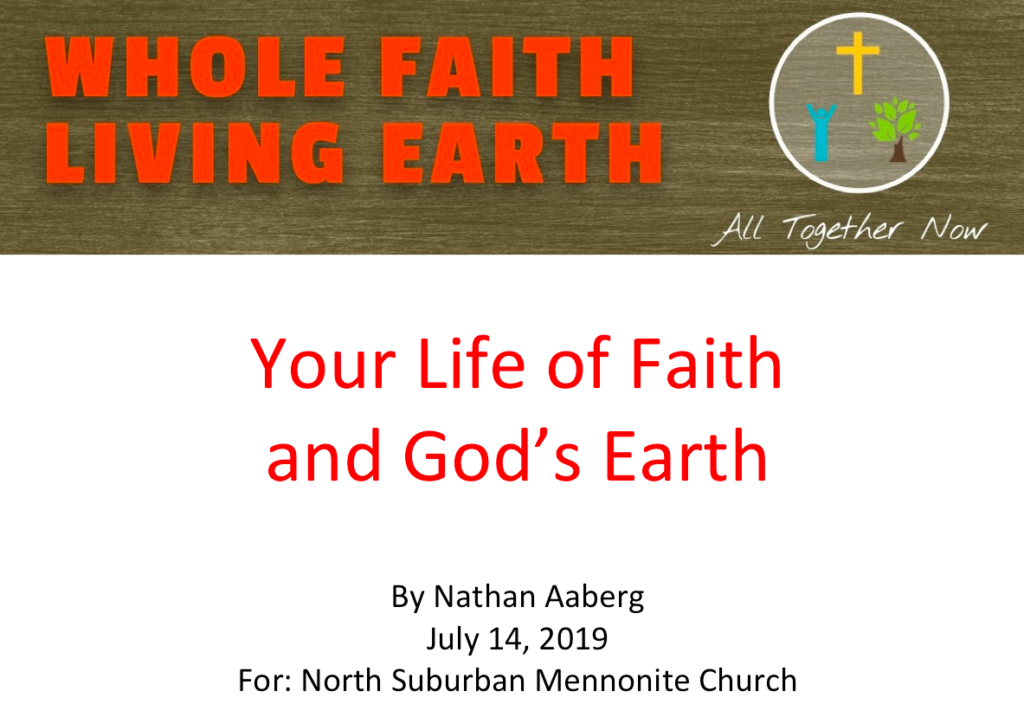
A medieval illumination of Jesus exorcizing the Gerasene demoniac from the Ottheinrich Folio. You need to look carefully to see the pigs.
Almost exactly one year ago, I wrote this blog on the story we find in Mark 5:1-20 about Jesus, demons, and the pigs. The standard interpretations assume the pigs are mere dumb animals whose deaths are meaingingless. I explored a different way of reading it.
I thought I was balanced in what I presented and liked what I wrote. Other people have found it interesting as well. Only my post about Solomon has been read more. This suggests that the Bible story of the demon and the pigs is troubling for many people. They are looking for a way to reconcile the story with a loving Savior and Creator God.
Very recently, another blogger – Raymond Hermann – also wrote a piece about the same story and referenced my piece. You can find his thinking – “Demons, Jesus, and the Pigs” – here. It’s worth reading.
You’ll find that Hermann disagrees with me that there is a possibility that the pigs committed suicide rather than live in possession by the demons.
Here’s what Hermann writes:
I’m sorry, but I can’t buy that answer; pigs can’t think and reason like humans. It makes a lot more sense that, considering what the demons did to the two men, the pigs were just overwhelmed and went berserk (another word for being possessed by a demon), therefore causing their own death. Or maybe Jesus directed them to do so, as part of a lesson.
There is certainly no scientific consensus that animals can intentionally commit suicide.And I realize my proposition that the pigs might actually have done so is highly speculative. The insanity-by-berserkness approach seems possible.
Further Thinking
Hermann’s piece, however, compels me to make several points.
First, I encourage you to read Pig Tales: An Omnivore’s Quest for Sustainable Meat by Barry Estabrook. If you are open-minded, the book will expand your estimation of pigs and their intelligence. You’ll even read of pigs beating young children in video games.
What’s more, I’ve come to realize the real question at hand is not the reasoning intelligence of pigs. It is whether they, like us, have heart in the Biblical sense of the word.
If we have open minds, we will find that a surprising number of animals seem to have something that I would call heart. In an early blog post I shared the story of a group of elephants who traveled for up to 12 hours to stand outside of the home of Lawrence Anthony who had just passed away. He had helped them, protected them, and rehabilitated them over many years.
Or check out this story from San Francisco in 2005. It tells how a humpback whale showed appreciation to each of the six divers that had helped to free it from crab pot lines that had become wrapped around its body and threatened to drown it.
Second, while there is no definitive scientific consensus, that doesn’t mean that animal suicide does not happen.
By chance I’ve just finished reading Giants of the Monsoon Forest by Jacob Shell. It’s a fascinating book about the centuries-long use of Asian elephants for forestry and transporation in northern Burma. The relationship between the elephants and their riders (mahouts) is far more complex and nuanced than I had realized.
Shell shares this disturbing incident:
I heard of an awful story of another elephant, a mother, found dead one morning. She was still standing, her forefeet crushing her own trunk. Evidently she had committed suicide. I didn’t understand how this was possible. Surely, as she lost consciousness from lack of oxygen, she would voluntarily breathe through her mouth, or the trunk would jerk free.
Science, as we know, is a powerful human tool for understanding the world. But it has limits. It assumes that if something does not act in ways that provide consistent evidence through our senses, then it does not exist. This assumption causes Science to tend to dismiss explanations of animal behavior that suggest complex volition. It also causes Science to dismiss the idea of a Creator God who interacts in complex ways with people and the rest of Creation.
In fact, Science would tell us the idea of believing in the possibility of demons, much less Jesus interacting with supernatural creatures, is absurd.
So we need to carefully consider the judgments of Science regarding animal volition and will.
Shell relates a moving incident during World War II. A convoy of elephants ridden by mahouts were making their way with rice and other food supplies to British and American soldiers in a remote area of Burma. After a tragic miscommunication, a number of mahouts and elephants were killed. Shell writes:
While the surviving mahouts regrouped and debated what to do, some of the surviving elephants picked up their dead mahouts and carried them all the way back to the mahouts’ families in Chowkham, some sixty miles away.
Third, Hermann offers another explanation for why the pigs didn’t swim. He writes, “Or maybe Jesus directed them to do so, as part of a lesson.”
The text does not suggest this at all.
Fourth, referencing a commentary, Hermann shares another interpretation:
Or perhaps this is another possible example of a miracle that has a visible lesson—the point being that the deliverance of one man (or two) is worth the destruction of many pigs.
That conclusion reflects a self-focused way of looking at how God works. Clearly, within the story’s logic, Jesus didn’t need to grant the demons’ wish. Jesus could have destroyed the demons without using the pigs. So the deliverance of the man wasn’t dependent on the demons moving to another host.
Fifth, our tendency, and one that Hermann seems to go along with, is to intently look for distinctions between us and Creation. That informs how we understand what Jesus meant when he said we are worth more than sparrows in God’s eyes, it doesn’t register at all that Jesus was also saying that sparrows are worth something to God.
We seemingly can’t help but see things in a binary way. If we matter, we wrongly think, then the rest of Creation does not. We think, also wrongly, that if Creation matters then somehow our standing is diminished.
In fact, in this story, God’s living creatures and humanity clearly share something significant in common. Dark forces can possess both of us. And that possession causes us both misery and suffering.
Pigs and the Restoration of All Things
In Acts 3:21, we read of Peter saying of Jesus, “For he must remain in heaven until the time for the final restoration of all things, as God promised long ago through his holy prophets.”
I’m convinced “all things” means “all things.” And “all things” will include pigs.
It will also include the restoration of our respect and right relationship with all of God’s Creation. That is very good news indeed.





